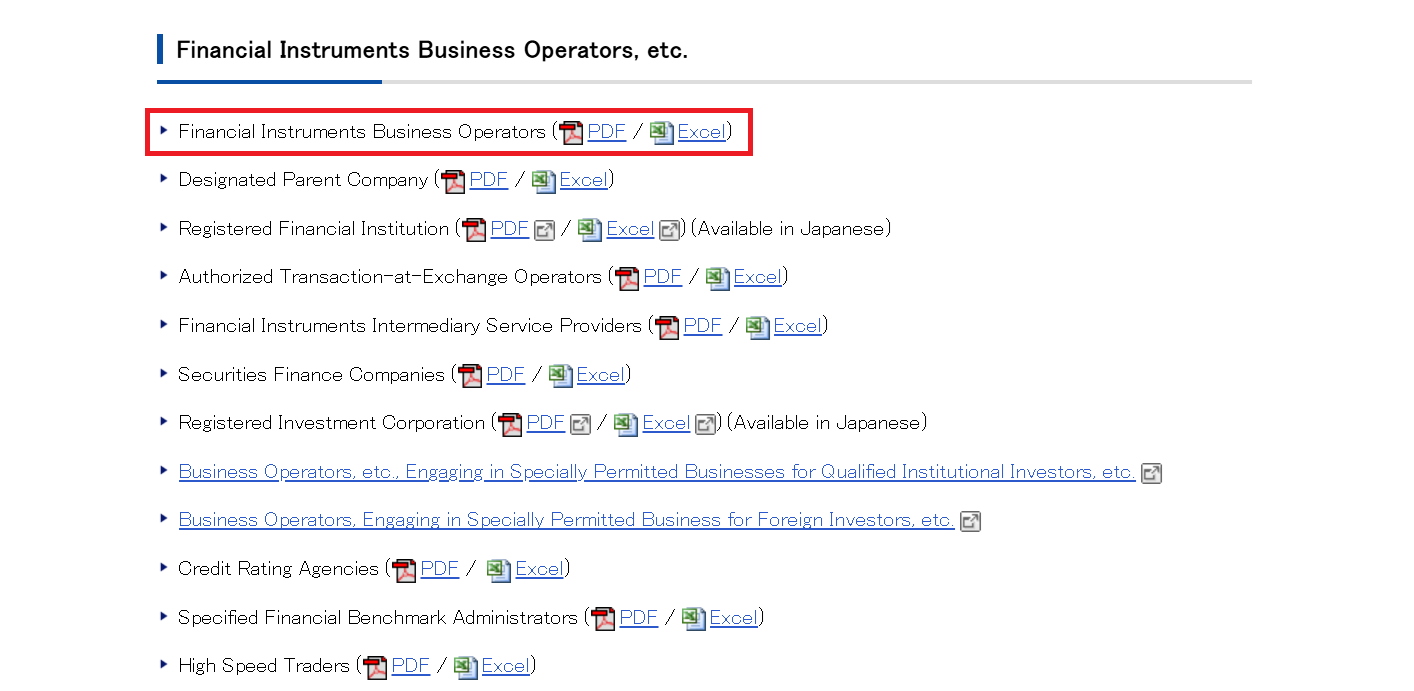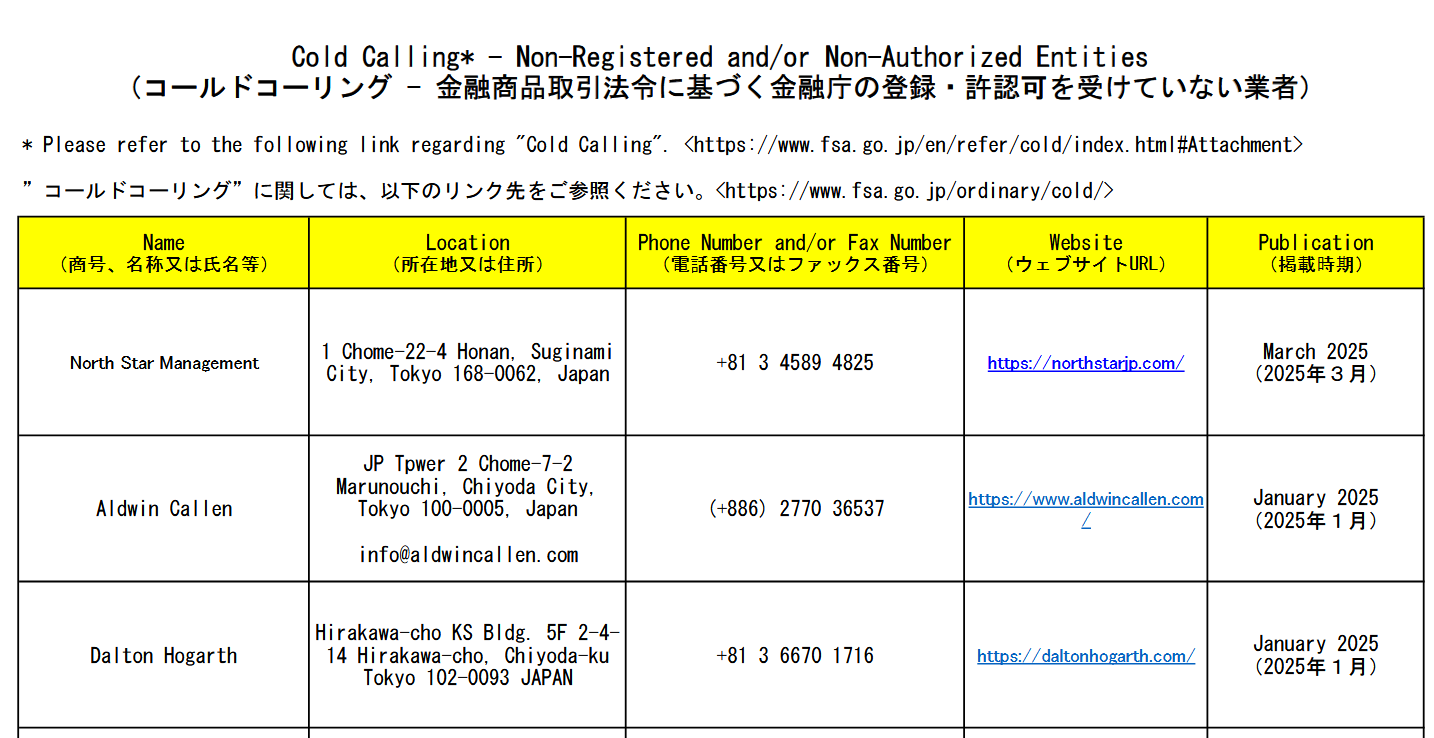Best Japan Financial Services Agency (FSA) Regulated Brokers 2026
We’ve personally tested and ranked the top brokers regulated by the Financial Services Agency (JFSA) in Japan, ensuring high standards of trust and reliability.
-
1Founded in 2006, AvaTrade is a top forex and CFD broker trusted by over 400,000 traders. Regulated in 9 regions, it handles more than 2 million trades monthly. AvaTrade offers platforms like MT4, MT5, and WebTrader, with over 1,250 instruments. Traders of all levels can explore CFDs, AvaOptions, and AvaFutures for short-term trading. AvaTrade provides excellent education and 24/5 multilingual customer support for a complete trading experience.
-
2
Trust Platform Assets Fees Accounts Research Education Mobile Support 3.8 Alpari is an offshore broker offering a variety of forex trading options, along with stock, index, and commodity CFDs. The broker also has fixed costs with pre-defined payouts. Trading is conducted on the trustworthy MT4 and MT5 platforms and the company's mobile app. Alpari is noteworthy for its narrow ECN spreads that cater well to active traders.
Compare The Top JFSA-Authorized Brokers
Safety Comparison
Compare how safe the Best Japan Financial Services Agency (FSA) Regulated Brokers 2026 are.
Mobile Trading Comparison
Compare the mobile trading features of the Best Japan Financial Services Agency (FSA) Regulated Brokers 2026.
Comparison for Beginners
Compare how suitable the Best Japan Financial Services Agency (FSA) Regulated Brokers 2026 are for beginners.
Comparison for Advanced Traders
Compare how suitable the Best Japan Financial Services Agency (FSA) Regulated Brokers 2026 are for advanced or professional traders.
Accounts Comparison
Compare the trading accounts offered by Best Japan Financial Services Agency (FSA) Regulated Brokers 2026.
Detailed Rating Comparison
Compare how we rated the Best Japan Financial Services Agency (FSA) Regulated Brokers 2026 in key areas.
Fee and Cost Comparison
Compare the cost of trading with the Best Japan Financial Services Agency (FSA) Regulated Brokers 2026.
Broker Popularity
See how popular the Best Japan Financial Services Agency (FSA) Regulated Brokers [year] are in terms of number of clients.
Why Trade With AvaTrade?
AvaTrade provides traders with essential tools: an intuitive WebTrader, strong AvaProtect risk management, a quick 5-minute sign-up, and reliable support for fast-paced markets.
Pros
- Years later, AvaTrade is still among the few brokers with a custom risk management tool, AvaProtect, which insures losses up to $1M for a fee and is simple to use on the platform.
- The WebTrader performed well in our tests, featuring an easy-to-use interface for beginners and strong charting tools, including 6 chart layouts and over 60 technical indicators.
- AvaTrade's support team did well in tests, responding within 3 minutes and providing local support in major regions like the UK, Europe, and the Middle East.
Cons
- The AvaSocial app is satisfactory but could be better. Its design, usability, and navigation between strategy providers and account management need improvement to compete with top platforms like eToro.
- Signing up is easy, but AvaTrade doesn't offer an ECN account like Pepperstone or IC Markets, which provides raw spreads and fast execution that many traders want.
- AvaTrade’s WebTrader has improved, but it needs more customization as widgets like market watch and watchlists can't be hidden, moved, or resized.
Why Trade With Alpari?
Alpari is suitable for binary options traders who prefer short-term trading. They offer strong charting features, a rebate system, and require only a $5 deposit. Forex traders will appreciate the high leverage and narrow spreads. Additionally, Alpari's PAMM service is ideal for investors who prefer not to manage their trading.
Pros
- There are many fee-free funding options to choose from.
- High-volume traders can avail of cashback programs.
- ECN accounts offer low or even zero commissions with narrow spreads.
Cons
- The market research and analysis tools are restricted.
- It's disappointing that there aren't as many educational resources as other options offer.
- The costs for strategy manager copy trading tools are quite high.
Filters
How BrokerListings.com Chose The Top JFSA Brokers
To find the best JFSA-regulated brokers in Japan, we:
- Checked broker claims with the JFSA database to verify licenses.
- Sorted the list using our overall ratings, leveraging 200+ data-driven metrics and hands-on testing insights.

What Is The JFSA?
The Japanese Financial Services Agency (JFSA) is the body tasked with regulating and supervising the Asian country’s financial markets. It has the power to sanction individuals and companies that fail to adhere to the standards it sets.
Created in 2000, it describes its mission as “ensuring stability of Japan’s financial system, protection of depositors, insurance policyholders and securities investors, and smooth finance through such measures as planning and policymaking concerning the financial system, inspection and supervision of private sector financial institutions, and surveillance of securities transactions.”
The JFSA is classified as a Category A regulator under BrokerListings’ broker regulator ranking system. This means investors can expect the highest levels of protection from bad industry practices and fraudulent entities.
What Powers Does The JFSA Have?
The regulator describes its three main policy objectives as:
- To ensure stability of Japan’s financial system.
- To bolster participants’ protection and convenience.
- To establish fair and transparent financial markets.
The JFSA establishes the rules by which financial institutions must abide, and issues licenses which companies like brokerages must have to operate in Japan. Financial services and product providers can have their licenses suspended – up to a maximum of six months – or revoked entirely if they are found to have breached the authority’s rules.
The regulator can also issue financial penalties when it deems wrongdoing has occurred. This includes fines of up to ¥500 million for companies operating without licenses, and fines not exceeding ¥5 million for employees.
The JFSA does not have the power to impose criminal sanctions such as custodial sentences for individuals. However, it can refer cases to Japan’s Public Prosecutors Office when it has evidence of criminal activity.
The JFSA has the power to investigate financial services providers under the Financial Instruments and Exchange Act of Japan (FIEA), the current version of which was created in 2006.
The legislation allows the JFSA to carry out on-site inspections, and to inspect companies’ assets, accounts and other documentation. It can also demand that financial services providers submit reports on their operations and their assets.
In October 2022, the JFSA ordered SMBC Nikko Securities to suspend some operations for three months, and undertake improvements to its business operations and compliance procedures. This followed investigations into alleged market manipulation and the illegal sharing of customer data across company departments.
The case was also referred to the Public Prosecutors Office, and in July 2025 the Tokyo District Court handed suspended prison sentences to five SMBC Nikko executives for price fixing.
What Rules Must A JFSA Broker Follow?
Under the terms of the FIEA, JFSA-licensed brokerages need to follow a comprehensive set of rules to remain industry compliant. These include:
- Ascertaining the client’s trading experience and knowledge, and recommending products that are strictly suited to their personal circumstances.
- Seeking out the best possible trading result for customers.
- Conducting due diligence on clients to prevent money laundering and the financing of terrorism.
- Disclosing transaction charges and other costs before a trade is placed.
- Providing documentation to clients once a transaction is concluded.
- Publishing advertising material that is clear and does not mislead regarding potential returns.
- Establishing systems for managing conflicts of interest.
- Managing customers’ assets separately from their own.
- Preparing and maintaining accurate records of customer transactions.
- Responding to and investigating customer complaints in good time.
How Can I Check If A Brokerage Is JFSA Regulated?
Traders and investors can check a broker’s regulatory status using the ‘List of licensed (registered) Financial Institutions’ page on the JFSA website.
Let’s say I wish to check the status of Dukascopy, which in Japan allows individuals to trade a wide range of markets including equities, forex, commodities and cryptocurrencies.
Using the webpage above, I navigate down to ‘Financial Instruments Business Operators’ and click on the PDF link to download the list of companies (a link to an Excel document is also available that provides the same information).

Using the JFSA’s website to check Dukascopy’s regulatory status. Source: JFSA
With the PDF open, I locate Dukascopy by using the search facility and typing in the broker’s name. I can see:
- The company’s license number, issued by the Kanto Local Finance Bureau under the FIEA.
- The broker’s address and telephone number.
- The type of activities the company is authorized to carry out.
Here I can see that Dukascopy is registered as a ‘Type I Financial Instruments Business.’ This means it can buy and sell financial instruments on behalf of clients; underwrite securities; operate a proprietary trading system; and accept client deposits in cash or other assets.

Finding Dukascopy’s listing on the Financial Instruments Business Operators directory. Source: JFSA
Traders can cross-reference the ‘Financial Instruments Business Operators’ with the ‘Classification of Financial Instruments Businesses’ to ascertain exactly what the activities the broker they’re considering is legally authorized to conduct under its JFSA license.
Pro tip: The JFSA also publishes a ‘Cold Callers’ list on its website that traders should check before handing over any cash or personal information.
The directory includes entities that are found to have disguised themselves as licensed brokers or asset management firms, and have approached potential clients via channels like telephone or e-mail.

The ‘Cold Callers’ directory. Source: JFSA
Bottom Line
It is imperative that traders and investors check a financial services provider’s regulatory status before divulging any personal data or handing over any cash.
With JFSA-approved brokers, individuals can expect excellent protection from bad actors and poor business practices.
Article Sources
Japanese Financial Services Agency (JFSA)
Financial Services Agency – JSFA
Financial Services Compliance 2021 – Anderson Mori & Tomotsune, Lexology
JFSA’s supervisory approaches – JFSA
FSA Weekly Review No.510 – JFSA
Former SMBC Nikko bankers found guilty of market manipulation – Financial Times
Outline of the bill for amendment of the Financial Instruments and Exchange Act,etc. – JFSA
Financial Instruments and Exchange Act (Act No. 25 of 1948) – JFSA
FAQ on Financial Instruments and Exchange Act – JFSA
Classification of Financial Instruments Businesses – JFSA
Cold Calling – Non-registered and/or non-authorized entities – JFSA

